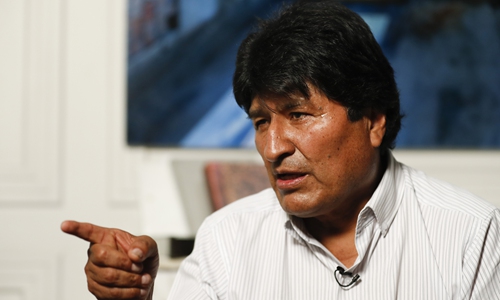HOME >> OPINION
Latin American people will be wary of external interference despite Morales’ resignation
By Pan Deng Source:Global Times Published: 2019/11/18 19:13:39

Former Bolivian president Evo Morales Photo: IC
Bolivia's former president Evo Morales announced his resignation on November 10 after weeks of protests that erupted after the presidential election results were announced on October 20.
The opposition led by the former president Carlos Mesa questioned the result, accusing Morales of "election fraud." Subsequently, the opposition launched protests with the support of the Organization of American States. Violence swept the Bolivian capital and major cities, leading to massive losses. According to official statistics, the 20-day conflict has claimed three lives while injuring 383 people as of November 9.
Morales was the country's first indigenous president since it was founded. As the class differences are consistent with race differences in the country, Morales gained his support from the middle and lower classes.
While Morales was in office, Bolivia achieved the highest decade-long economic growth in any Latin American country, reducing poverty by 40 percent and extreme poverty by 60 percent. However, this hero left the country in turmoil for three weeks, and the country's military abandoned him.
There are two reasons that explain Morales' dramatic downfall.
Bolivia is a resource-rich country that depends on exports of primary products. The geographical position of the landlocked country limits international exchange. The country has always had a high poverty rate while incurring huge debt.
Historically, the country has been dominated by a small number of European descendants, and its indigenous community has remained overlooked. When Morales came to power in 2005, he took a grass-roots approach when creating his administration, and his efforts focused on solving the problems of disadvantaged ethnic groups and building infrastructure.
Politically, he shook the upper classes by increasing taxes on the rich to subsidize the welfare of the poor, which created tensions among ethnic groups and peeved the country's elite.
As a left-wing president, Morales faced resistance from the US and pro-US elites. The US controlled Latin America with its political, economic, and value-driven perspectives as a result of the Monroe Doctrine.
Bolivia, along with Cuba and Venezuela, has been the target of the US in the past few years. Affected by the regional situation, South America's right wing is being constrained by the left, but the US needs to stabilize its backyard to support the implementation of its global strategy. So, it is not surprising to see the US intervene in Bolivia's internal affairs taking advantage of the country's election turmoil.
Morales was granted asylum in Mexico, and many left-wing politicians have resigned. Bolivia's right-wing gained political leverage, but public support is another issue.
Neither the left nor the right can choose a successor with a broad mass base like Morales.
Although Jeanine Anez, the opposition leader in Bolivia's Senate who is fiercely anti-Morales, declared herself the country's interim president on November 12 even though she lacked a quorum because of a boycott by Morales-led Movement for Socialism party.
In the first decade of the 21st century, left-wing forces rose in Latin America. They claimed power in many countries and even once shaped the political environment in the region.
When Morales was in office, other left-wing leaders in Latin America included late Venezuelan president Hugo Chavez, former Brazilian president Luiz Inacio Lula da Silva, late Argentine president Nestor Kirchner, and the former and first female president of Chile Mitchell Bachelet.
Latin American left-wing parties have suffered setbacks in recent years. But their broad social foundation still plays an important role today. It is impossible for a group of people who have awakened to turn a blind eye to their internal affairs and the economy being controlled by foreign powers. It has been a consensus of regional countries to oppose military intervention of outside big powers although these countries have seen clear competition between the left and right parties.
Many South American countries are experiencing turmoil and disorder fundamentally because the governments did not properly handle livelihood issues that caused regional instability. Neither did Morales.
China-Bolivia relations developed rapidly during the Morales administration and were based on common interests and mutual needs. The two countries adhere to the concept of equality, mutual benefit, and win-win cooperation.
The chaos in Bolivia will create hurdles for existing cooperation projects with China. But their ties will not be affected in the long run.
The author is executive director of the Ibero-America Law Center of China University of Political Science and Law. opinion@globaltimes.com.cn
Posted in: VIEWPOINT